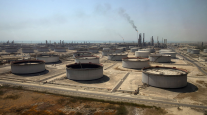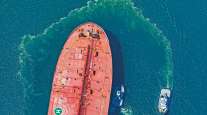Bloomberg News
World’s Largest Offshore Rig Owner Valaris Goes Bankrupt

[Ensure you have all the info you need in these unprecedented times. Subscribe now.]
Valaris Plc became the latest casualty of the global slump in oil prices, filing for bankruptcy Aug. 19 as the world’s largest offshore rig owner by fleet size seeks to restructure a roughly $7 billion debt load.
The Chapter 11 filing in the U.S. Bankruptcy Court for the Southern District of Texas comes after the company said it could be forced to seek creditor protection after skipping bond payments.
Valaris has entered into a binding restructuring support agreement with about half of its noteholders and received $500 million in debtor-in-possession financing, the company said in a statement. The company listed total assets of about $13 billion and total debts of about $7.85 billion in its bankruptcy petition. Under the restructuring proposal, Valaris will cancel shares and will swap for equity its revolving credit facility and unsecured notes.
“The substantial downturn in the energy sector, exacerbated by the COVID-19 pandemic, requires that we take this step to create a stronger company able to adapt to the prolonged contraction in the industry,” Valaris CEO Tom Burke said in the statement. The company plans to continue serving customers uninterrupted throughout the bankruptcy, he said.
The restructuring agreement, which will cut more than $6.5 billion of debt, will convert Valaris’s existing credit facility and unsecured notes to equity, according to the statement. Existing note holders agreed to backstop $500 million of new notes.
London-based Valaris, which was created in 2019 out of the combination of Ensco Plc and Rowan Companies Plc., joins rivals Noble Corp. and Diamond Offshore Drilling Inc. in bankruptcy. Pacific Drilling SA earlier this month said it may return to bankruptcy court for the second time in less than three years, and Transocean Ltd., the world’s biggest owner of deepwater oil rigs, has said it’s exploring strategic alternatives.
The offshore industry has struggled since oil prices plunged to less than $30 a barrel in 2016 after reaching more than $100 in mid-2014. While newer deepwater projects are less expensive, they still take longer to develop than land-based shale wells and typically are more costly, leaving them at a disadvantage as crude plummeted further earlier this year amid the COVID-19 pandemic.
Want more news? Listen to today's daily briefing:
Subscribe: Apple Podcasts | Spotify | Amazon Alexa | Google Assistant | More




